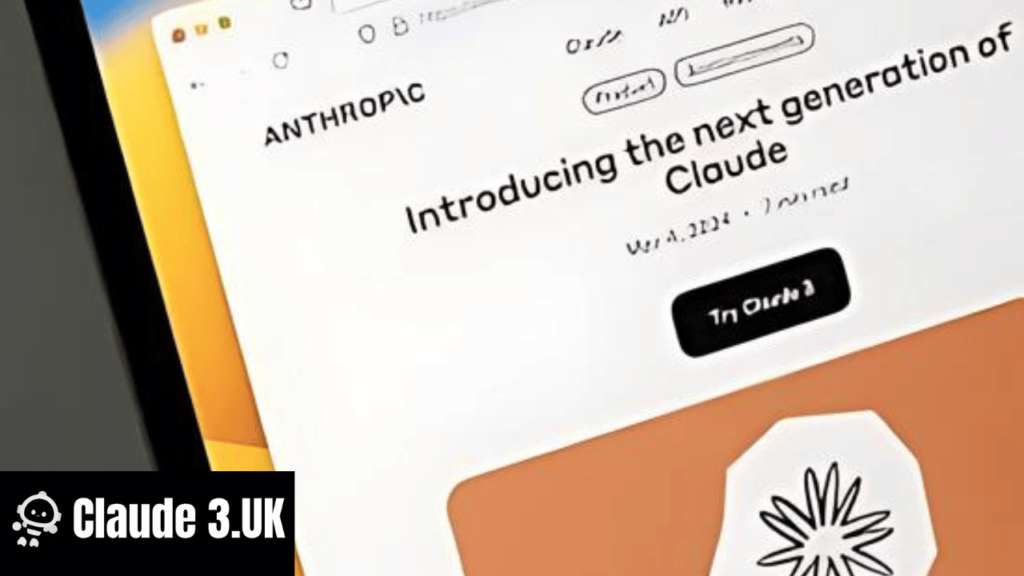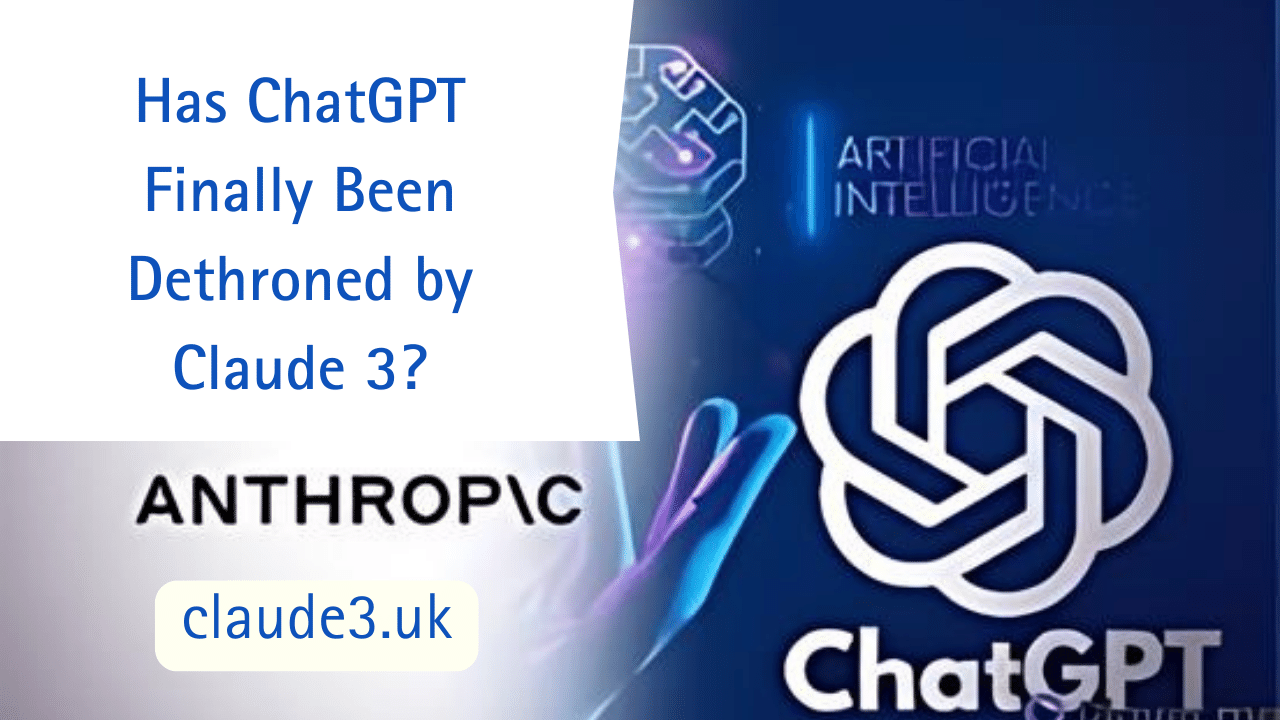Introduction
The artificial intelligence (AI) landscape is rapidly evolving, with new models and advancements continuously pushing the boundaries of what AI can achieve. Among the leading AI conversational agents, OpenAI’s ChatGPT and Anthropic’s Claude 3 have been prominent contenders. ChatGPT, powered by the GPT-4 architecture, has been a dominant force, widely recognized for its versatility and powerful language processing capabilities. However, with the emergence of Claude 3, developed by Anthropic, there is growing speculation that ChatGPT’s reign may be challenged. This article delves into the advancements of Claude 3, its performance compared to ChatGPT, and the implications of this rivalry in the AI field.
Overview of ChatGPT and Claude 3
ChatGPT: A Leader in Conversational AI
ChatGPT, developed by OpenAI, has been a groundbreaking model in the field of natural language processing (NLP). Based on the GPT-4 architecture, ChatGPT leverages a vast amount of training data and sophisticated algorithms to generate human-like responses. It is widely used for various applications, including customer service, content generation, and educational tools. ChatGPT’s strengths lie in its ability to understand complex queries, generate coherent and contextually relevant responses, and perform a wide range of language tasks with high accuracy.
Claude 3: The Challenger
Claude 3, the latest AI model from Anthropic, represents a significant leap in AI development. Named after Claude Shannon, the father of information theory, Claude 3 is designed with a strong emphasis on ethical AI and human-aligned behavior. It boasts several improvements over its predecessors, particularly in its ability to handle longer contexts and complex tasks. Claude 3 has been making waves in the AI community for its superior performance in coding tasks and its robust handling of extended interactions.
Key Advancements of Claude 3
Superior Coding Capabilities
One of Claude 3‘s most notable advancements is its superior performance in coding tasks. It has outperformed ChatGPT in various human evaluation benchmarks, demonstrating a marked improvement in handling complex coding tasks. Claude 3’s ability to understand, generate, and debug code with high accuracy makes it a preferred choice for developers and programmers. This enhancement is particularly evident in its ability to provide reliable coding assistance, detect errors, and offer solutions for intricate coding challenges.
Handling Longer Contexts
Claude 3 excels in processing longer contexts more effectively than ChatGPT. This capability allows it to maintain coherence and relevance over extended interactions, making it better suited for tasks that require sustained attention and detailed analysis. Whether it’s technical documentation, project management, or educational content, Claude 3’s ability to keep track of lengthy and complex conversations provides a significant advantage.
Enhanced Human Evaluation Benchmarks
Claude 3 has achieved superior performance in various human evaluation benchmarks, particularly in coding and comprehension tasks. These benchmarks assess the AI’s ability to understand, process, and generate human-like responses in a range of scenarios. Claude 3’s higher scores in these evaluations highlight its advanced capabilities and reliability, setting a new standard in AI performance.
Comparative Analysis: Claude 3 vs. ChatGPT
Coding Performance
Complexity Handling
Claude 3 has shown a distinct advantage in handling complex coding tasks. Its ability to understand intricate coding queries and generate accurate solutions makes it a powerful tool for developers. While ChatGPT is competent in coding, it often struggles with the same level of complexity, particularly in generating error-free code.
Error Detection and Correction
Claude 3’s ability to detect and correct errors in code is another area where it outshines ChatGPT. This capability is invaluable for debugging and refining code, ensuring that developers can rely on Claude 3 for precise and effective coding assistance.
Contextual Understanding
Extended Interactions
Claude 3’s ability to process longer contexts makes it more adept at extended interactions. Whether maintaining the thread of a conversation over multiple exchanges or keeping track of detailed instructions, Claude 3 provides more coherent and relevant output, enhancing user experience.
Context Retention
Claude 3 retains context more effectively than ChatGPT, reducing the need for users to repeat information or clarify previous interactions. This feature enhances the user experience by making interactions more fluid and less repetitive.
User Experience and Reliability
Response Coherence
The coherence of responses generated by Claude 3 is superior, especially over extended interactions. Users find Claude 3’s outputs more aligned with their queries and more relevant to the ongoing conversation, enhancing overall user satisfaction.
Reliability in High-Stakes Tasks
For high-stakes tasks such as financial forecasting, legal analysis, or medical diagnostics, Claude 3 provides a significant advantage due to its reliability and accuracy in processing and generating information in complex scenarios. This makes it a more trustworthy tool for critical applications.
Real-World Applications of Claude 3
Software Development
Claude 3’s advanced coding capabilities make it an invaluable asset for software development. Developers can use it to write, debug, and optimize code, significantly reducing the time and effort required for complex programming tasks. Its error detection and correction features further enhance productivity by ensuring high-quality code output.
Technical Documentation
For creating and maintaining technical documentation, Claude 3’s ability to handle long contexts is particularly beneficial. It can generate detailed, coherent, and accurate documentation, which is essential for complex projects that require comprehensive and clear instructions.
Educational Tools
Claude 3’s advanced contextual understanding and response coherence make it an excellent tool for educational purposes. It can provide detailed explanations, maintain engaging conversations, and offer reliable assistance with complex topics, making it a valuable resource for students and educators alike.
Customer Support
In customer support scenarios, Claude 3’s ability to process and retain context over extended interactions ensures that users receive consistent and relevant assistance. This capability reduces the need for customers to repeatedly explain their issues, leading to a more efficient and satisfying support experience.
Challenges and Limitations
Ethical and Safety Concerns
Despite its advancements, Claude 3, like all AI models, faces ethical and safety concerns. Ensuring that the AI behaves ethically and aligns with human values is a continuous challenge. Developers must remain vigilant to prevent misuse and address any potential biases or harmful behaviors.
Data Privacy
The use of AI models raises significant data privacy issues. Ensuring that user data is handled securely and responsibly is crucial to maintaining trust and compliance with regulatory standards. Both Claude 3 and ChatGPT must adhere to stringent data protection practices to safeguard user information.
Technical Limitations
While Claude 3 has made significant strides, it is not without its technical limitations. Continued improvements in processing power, algorithm efficiency, and data management are necessary to further enhance its capabilities and reliability.
Future Prospects
Advancements in AI Technology
The future of AI technology holds immense potential for further advancements. Ongoing research and development will likely lead to even more sophisticated models capable of performing increasingly complex tasks with greater accuracy and reliability.
Integration with Other Technologies
Integrating AI models like Claude 3 with other emerging technologies, such as quantum computing and advanced robotics, could unlock new possibilities and applications. These integrations will enhance the capabilities of AI, making it an even more powerful tool across various industries.
Ethical AI Development
As AI continues to evolve, the emphasis on ethical development will become increasingly important. Ensuring that AI models are designed and used responsibly, with a focus on fairness, transparency, and accountability, will be crucial for their widespread adoption and acceptance.

Conclusion
The competition between ChatGPT and Claude 3 represents a significant milestone in the evolution of AI technology. While ChatGPT has long been a leader in the field, recent developments suggest that Claude 3 may have surpassed it, particularly in coding tasks and handling complex contexts.
Claude 3’s superior performance in human evaluation benchmarks, its ability to process longer contexts, and its enhanced coding capabilities position it as a formidable contender in the AI landscape.
As AI technology continues to advance, the focus on enhancing capabilities, ensuring ethical behavior, and addressing technical limitations will be critical. The rivalry between ChatGPT and Claude 3 is a testament to the rapid progress being made and highlights the exciting potential for future developments in AI.
Whether Claude 3 has truly dethroned ChatGPT remains to be seen, but its impressive advancements undoubtedly mark a significant step forward in the quest for ever-more capable and reliable AI systems.
FAQs
Why is there a debate about Claude 3 dethroning ChatGPT?
The debate stems from Claude 3’s superior performance in coding tasks and human evaluation benchmarks. Its ability to handle complex coding tasks and longer contexts has raised questions about whether it has surpassed ChatGPT’s capabilities.
How does Claude 3 outperform ChatGPT in coding tasks?
Claude 3 demonstrates a marked improvement in understanding, generating, and debugging code. It can handle more complex coding queries and provide accurate, reliable solutions, making it a preferred tool for developers.
What are the advantages of Claude 3 in handling longer contexts?
Claude 3 can maintain coherence and relevance over extended interactions better than ChatGPT. This capability is crucial for tasks that require sustained attention and detailed analysis, such as technical documentation and educational content.
Are there any ethical concerns with using Claude 3?
Like all AI models, Claude 3 faces ethical and safety concerns. Ensuring that the AI behaves ethically and aligns with human values is a continuous challenge that developers must address to prevent misuse and bias.
How do ChatGPT and Claude 3 handle data privacy?
Both ChatGPT and Claude 3 must adhere to stringent data protection practices to safeguard user information. Ensuring that user data is handled securely and responsibly is crucial for maintaining trust and compliance with regulatory standards.
What future advancements can we expect in AI technology?
Future advancements in AI technology may include more sophisticated models, integration with other emerging technologies like quantum computing, and a stronger focus on ethical AI development to ensure responsible and fair use.
Has Claude 3 definitively dethroned ChatGPT?
While Claude 3 has made significant advancements, whether it has definitively dethroned ChatGPT remains a topic of debate. Its impressive performance in certain areas marks a significant step forward, but both models have their unique strengths and continue to evolve.

1 thought on “Has ChatGPT Finally Been Dethroned by Claude 3?”